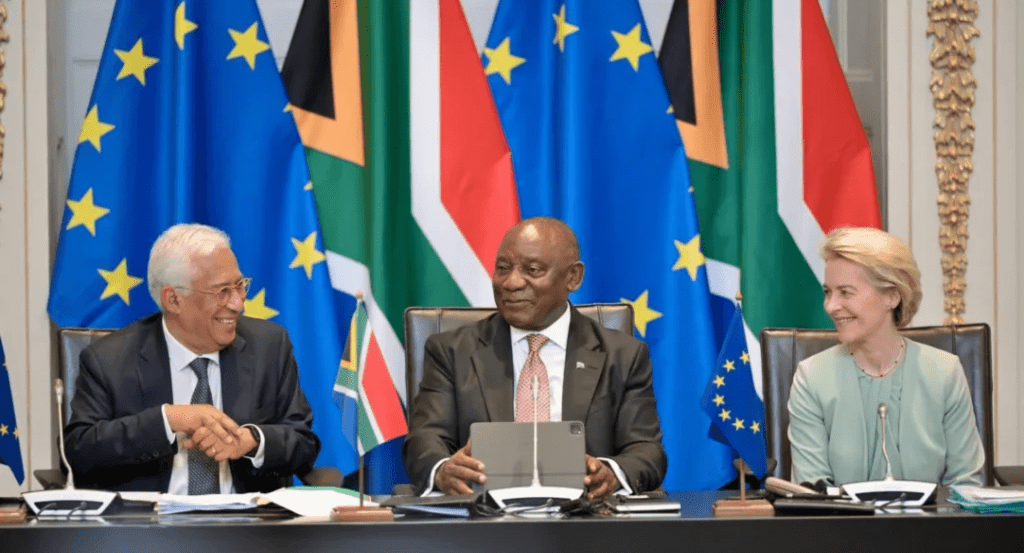The European Union (EU) and South Africa have officially started negotiations for a historic Clean Trade and Investment Partnership, marking South Africa as the first country to enter this new generation of EU trade agreements. During the EU-South Africa Summit in Cape Town, European Commission President Ursula von der Leyen announced a €4.7 billion Global Gateway investment package aimed at clean energy, infrastructure, and healthcare.
Why This Partnership Matters
This agreement reinforces the EU’s long-term commitment to Africa’s green transition and economic development. Because of its critical raw materials and clean energy potential, South Africa is now positioned as a key strategic partner in Europe’s shift toward a low-carbon economy.
“We want to work together on three key initiatives. First, together we invest massively in projects that support the Just Energy Transition Partnership. We are doubling down with our support. We are here to stay,” — Ursula von der Leyen, European Commission President
Breakdown of the €4.7 Billion Investment
1. Clean Energy (€4.4 Billion Investment)
The bulk of the package—€4.4 billion—will go toward renewable energy projects that support:
- Green hydrogen production,
- Battery technology advancements, and
- The expansion of renewable energy sources such as solar, wind, and hydroelectric power.
These investments align with South Africa’s Just Energy Transition Partnership (JETP), which seeks to move the country away from coal dependency and toward sustainable energy solutions.
READ ALSO: Africa’s Green Economy Summit 2025: AfDB Calls for Tripling of Climate Finance
2. Connectivity Infrastructure
In addition to clean energy, the partnership includes major infrastructure investments that will enhance physical and digital connectivity. Specifically, the plan focuses on:
- Railway and port upgrades between Lubumbashi (DRC) and Durban (South Africa), and
- Expanding nationwide fiber and 5G networks to improve digital accessibility.
By modernizing its transport and digital infrastructure, South Africa will strengthen regional trade and economic integration.
3. Healthcare (€700 Million Investment)
The agreement also prioritizes the healthcare sector, allocating €700 million to boost pharmaceutical production. Key initiatives include:
- Increasing local vaccine and medicine manufacturing, and
- Strengthening supply chains for essential medical products.
As a result, South Africa will reduce its dependence on imported medicines while enhancing regional healthcare security.
How This Partnership Differs from Previous EU-South Africa Agreements
Unlike past trade agreements, which mainly focused on raw material exports, this new partnership emphasizes:
- Sustainable energy and technology rather than fossil fuels,
- Local value creation, ensuring that economic benefits remain in South Africa, and
- Long-term investments in infrastructure and health, rather than short-term aid.
Von der Leyen highlighted this shift, stating:
“It’s important for us that the value added stays in South Africa. You will benefit. Our companies will benefit. And I think it is a true win-win.”
Global Implications
The Global Gateway investment package aligns with the Scaling Up Renewables in Africa campaign, which is expected to gain momentum at the upcoming G20 Summit in Johannesburg. Notably, this will be the first-ever G20 Summit held in Africa—an opportunity to push for equitable global energy policies.
“Together we have launched a global campaign to power Africa with clean energy. Africa has enormous potential for renewable energy. The world is finally recognizing it.” — Ursula von der Leyen
What This Means for South Africa and Africa’s Green Future
- Economic growth through clean energy investments,
- Job creation in renewable energy, infrastructure, and healthcare,
- Stronger trade relations between South Africa and the EU, and
- A potential model for future EU trade agreements with other African nations.
Conclusion
The EU-South Africa Clean Trade and Investment Partnership marks a major milestone in sustainable global trade. With €4.7 billion in investments, South Africa is set to become a leading clean energy hub in Africa. Moving forward, this deal will shape the continent’s green economy, fostering a sustainable and resilient future.






















